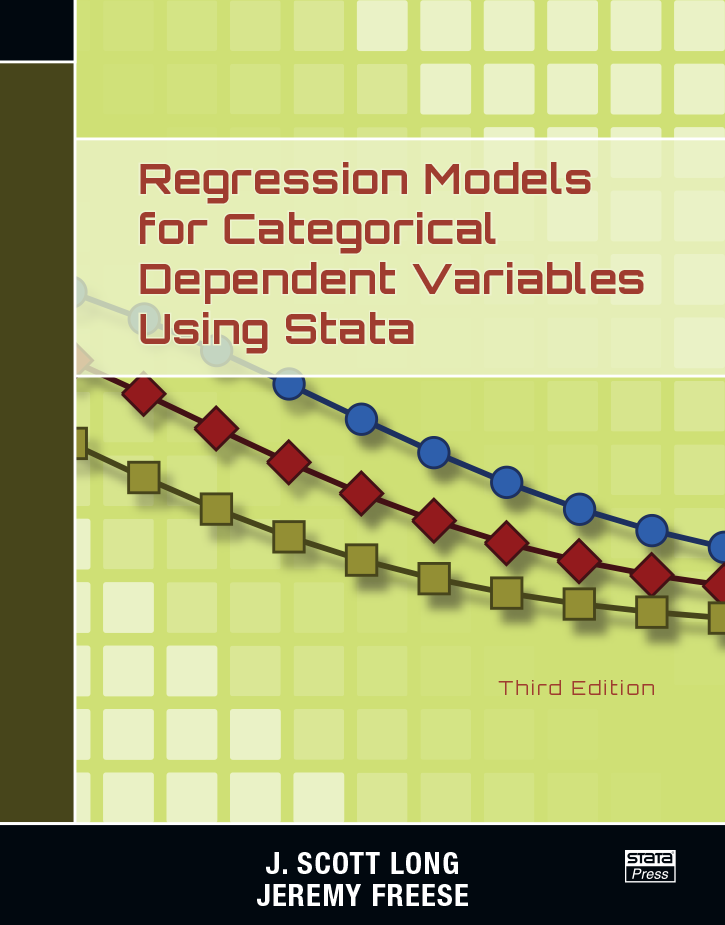| Scott Long is Distinguished Professor and Chancellor's Professor of Sociology and Statistics at Indiana University, Bloomington. He teaches quantitative methods both at Indiana University and at the ICSPR Summer Program. His earlier research examined gender differences in the scientific career. In recent years, he has collaborated with Eliza Pavalko, Bernice Pescsolido, John Bancroft, Julia Heiman and others in studies of health and aging, stigma and mental health, and human sexuality. |  |
Group comparisons in logit and probit using predicted probabilities J. Scott Long and Sarah Mustillo. 2017. "Using predictions to compare groups in regression models for binary outcomes." Working paper 2018-03-05. Click here to download.
ICPSR Workshop on Modeling Categorical Outcomes: Advanced Methods for Models with Binary, Ordinal, and Nominal Outcomes June 11 - June 15, 2018 at the ICPSR Summer Program in Ann Arbor, MI. Click here for details about the class. To enroll, contact the ICPSR Summer Program.
ICPSR Workshop on Optimal Methods and Strategies for Reproducible Research: Publish More and Faster with Less Stress! August 13 - August 17, 2018 at the ICPSR Summer Program in Ann Arbor, MI. Click here for details about the class. To enroll, contact the ICPSR Summer Program.
 |
Regression Models for Categorical Dependent Variables Using Stata, Third Edition began shipping on September 2, 2014. This edition is a complete rewrite of the second edition, taking full advantage of Stata's margins command and factor variable notation. Many new methods of interpretation are introduced using SPost13, a complete rewrite of SPost9. In Stata, enter: search spost13 to download commands and sample files. You can read the preface or a preliminary table of contents. In summer 2016, an e-version of the book was published. Why use the SPost13 mgen, mchange, and mtable commands instead of margins? Check here. |
Lecture in Workshop in Methods: Reproducible Results and the Workflow of Data Analysis is being given on Friday, August 25, 2016 from 1:00-2:30pm in Social Science Research Commons Grand Hall (Woodburn Hall 200). Abstract: Many disciplines are paying increasing attention to reproducible results. The fundamental idea is that other scientists should have access to your data and be able to obtain the same results—this is reproducibility. More generally, your results should be robust so that other scientists can confirm your findings using other data. Increasingly journals require authors to provide their data and analysis file before a paper is accepted to verify that that results. Producing reproducible results is highly dependent on your workflow for data analysis. This workflow encompasses the entire process of scientific research: Planning, documenting, and organizing your work; creating, labeling, naming, and verifying variables; performing and presenting statistical analyses; preserving your work; and ending with reproducible results. Most of the work in statistics classes focuses on estimating and interpreting models. In “real world” research projects, these activities may involve less than 10% of the total work. Professor Long’s talk is about the other 90% of the work. An efficient workflow saves time, introduces greater reliability into the steps of the analysis, and generates reproducible results.
Stat 612: Reproducible results and the workflow of data analysis is being taught Spring 2017.
Short courses: I frequently teach short courses on categorical data analysis, Stata, and methods for reproducible research. Please contact me for further information.
Regression Models for Nominal and Ordinal Outcomes can be downloaded here; updated on 25Feb2013. Your comments are appreciated.
Group comparisons in logit and probit using predicted probabilities This working paper from 2005 is now a complete draft. The paper can be downloaded here. For further information on details on using Stata for group comparisons, go here.
The Workflow of Data Analysis using Stata began shipping on November 20, 2008. To order a copy, go here. As of 2016, and e-version is available. For more information about the workflow project, check the Workflow Web Site.
The Department of Statistics at Indiana University was created on July 1, 2006. Click here for details.
From Scarcity to Visibility: Gender Differences in the Careers of Doctoral Scientists and Engineers by J. Scott Long is now available from the National Academy Press. This book documents the changes that have occurred in the presence and participation of women in science and engineering from 1973 to 1995. For more information, click here.
The Chinese edition of Regression Models for Categorical and Limited Dependent Variables has been published. For details, click here.